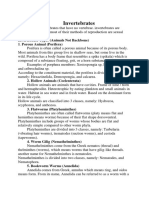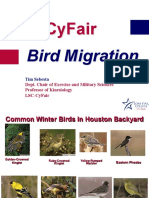0 ratings0% found this document useful (0 votes)
108 viewsRainforest Powerpoint
Rainforest Powerpoint
Uploaded by
api-287500978Rainforests are dense, warm forests located near the equator that provide habitat for millions of plant and animal species. They generate much of the earth's oxygen and have distinct layers - the emergent, canopy, understory, and forest floor - that each support different life. Rainforests are extremely biodiverse, containing a vast variety of insects, arachnids, reptiles, amphibians, birds, and mammals that live in the forest's various levels, such as birds in the canopy and jaguars on the forest floor.
Copyright:
© All Rights Reserved
Available Formats
Download as PPT, PDF, TXT or read online from Scribd
Rainforest Powerpoint
Rainforest Powerpoint
Uploaded by
api-2875009780 ratings0% found this document useful (0 votes)
108 views11 pagesRainforests are dense, warm forests located near the equator that provide habitat for millions of plant and animal species. They generate much of the earth's oxygen and have distinct layers - the emergent, canopy, understory, and forest floor - that each support different life. Rainforests are extremely biodiverse, containing a vast variety of insects, arachnids, reptiles, amphibians, birds, and mammals that live in the forest's various levels, such as birds in the canopy and jaguars on the forest floor.
Original Title
rainforest powerpoint
Copyright
© © All Rights Reserved
Available Formats
PPT, PDF, TXT or read online from Scribd
Share this document
Did you find this document useful?
Is this content inappropriate?
Rainforests are dense, warm forests located near the equator that provide habitat for millions of plant and animal species. They generate much of the earth's oxygen and have distinct layers - the emergent, canopy, understory, and forest floor - that each support different life. Rainforests are extremely biodiverse, containing a vast variety of insects, arachnids, reptiles, amphibians, birds, and mammals that live in the forest's various levels, such as birds in the canopy and jaguars on the forest floor.
Copyright:
© All Rights Reserved
Available Formats
Download as PPT, PDF, TXT or read online from Scribd
Download as ppt, pdf, or txt
0 ratings0% found this document useful (0 votes)
108 views11 pagesRainforest Powerpoint
Rainforest Powerpoint
Uploaded by
api-287500978Rainforests are dense, warm forests located near the equator that provide habitat for millions of plant and animal species. They generate much of the earth's oxygen and have distinct layers - the emergent, canopy, understory, and forest floor - that each support different life. Rainforests are extremely biodiverse, containing a vast variety of insects, arachnids, reptiles, amphibians, birds, and mammals that live in the forest's various levels, such as birds in the canopy and jaguars on the forest floor.
Copyright:
© All Rights Reserved
Available Formats
Download as PPT, PDF, TXT or read online from Scribd
Download as ppt, pdf, or txt
You are on page 1of 11
Rainforests as habitats
What are rainforests?
Rainforests are very dense, warm, wet forests.
They are habitats for millions of plants and
animals.
Rainforests are extremely important in the
ecology of the Earth. The plants of the
rainforest generate much of the Earth's oxygen.
Where are the rainforests?
Tropical rainforests are found in a belt around
the Equator of the Earth.
There are tropical rainforests across South
America, Central America, Africa, South East
Asia and Australia.
Layers of the rainforest
Different animals and plants live in different parts of the
rainforest. Scientists divide the rainforest into different layers
(zones) based on the living environment. Starting at the top the
layers are:
EMERGENTS: Giant trees that are much
higher than the average canopy height. It
houses many birds and insects.
CANOPY: The upper parts of the trees.
This leafy environment is full of life in a
tropical rainforest and includes: insects,
birds, reptiles, mammals, and more.
UNDERSTORY: A dark, cool environment
under the leaves but over the ground.
FOREST FLOOR: Teeming with animal
life, especially insects. The largest
animals in the rainforest generally live
here.
Animals of the rainforest.
Rainforests are tremendously rich
in animal life. Rainforests are
populated with insects (like
butterflies and beetles), arachnids
(like spiders and ticks), worms,
reptiles (like snakes and lizards),
amphibians (like frogs and toads),
birds (like parrots and toucans)
and mammals (like sloths, monkeys,
apes and jaguars).
Different animals live in different strata of the
rainforest. For example, birds live in the canopy (upper
leaves of the trees) and in the emergents (the tops of the
tallest trees). Large animals (like jaguars) generally live on
the forest floor, but others (like howler monkeys and
sloths) are arboreal (living in trees). Insects are found
almost everywhere.
Morpho Butterfly- lives in the canopy. Has a wing span of 18 cm.
Many birds live in the Emergent (top) layer. They look
for nesting places and are away from predators.
The canopy is home to many
birds and monkeys.
The understory layer gets little light and is home to
many animals like frogs, bats, apes and owls.
There are ant eaters and leafcutter ants.
The forest floor is home to many insects, spiders
and large animals like jaguars and ocelots.
Chlamydosaurus kingii
Green palm viper arboreal snake
Invent a rainforest creature of your own.
This is a Butterfroguin. It lives in the Brazilian rainforest.
Zoologists have never seen it flying, and believe it uses its wings
to attract insects and butterflies to eat. The Butterfroguin is a
mix of butterfly, frog and penguin.
Howler Monkey Genus Alouatta
General information
The Howler Monkey is the loudest monkey and the
loudest land animal. The only animal that is louder than
the Howler Monkey is the Blue Whale. The Howler's call
can be heard up to three miles (4.8 km) away.
The Howler is the largest New World monkey (monkeys
from South, North, and Central America).
Habitat
These social primates live high in the trees (the canopy)
of the rain forests of southern Brazil, northern Argentina,
Paraguay, and Bolivia. Howlers have a life span of about
20 years. These monkeys are in decline due to a loss of
habitat.
Anatomy
Adult male Howlers are black to brown; females and the
young are lighter in colour. Howlers grow to be about 2 to
4 feet (0.6 to 1.2 m) tall and weigh from 8 to 22 pounds
(3.5 to 10 kg). They have a long tail, a short snout, and
wide-set, round nostrils. Adults females usually have one
baby at a time.
Diet
Howlers eat mostly leaves, but occasionally supplement
their diet with fruit and maggots.
Predators
Large birds of prey (like the harpy eagle) prey upon the
howler monkey.
You might also like
- Unit 22 - SITHCCC005 - Prepare Dishes Using Basic Methods of Cookery - AssessmentDocument25 pagesUnit 22 - SITHCCC005 - Prepare Dishes Using Basic Methods of Cookery - Assessmentwriter top63% (8)
- 1.07 Umbrellaology Graded AssignmentDocument4 pages1.07 Umbrellaology Graded AssignmentTracy Dababseh100% (1)
- Mte511 - v2 - Theorists - Worksheet 2Document5 pagesMte511 - v2 - Theorists - Worksheet 2connie thomeczek100% (1)
- Nikon Metrology: CAMIO 8.1Document1,204 pagesNikon Metrology: CAMIO 8.1MememetNo ratings yet
- Endemic SpeciesDocument23 pagesEndemic Speciesparuparvathi23No ratings yet
- The Jungle Book Script Final VersionDocument39 pagesThe Jungle Book Script Final Versionphilippahirst576075% (4)
- Ekalavya - The Real HeroDocument5 pagesEkalavya - The Real Heromnhs282No ratings yet
- Rainforest PowerpointDocument11 pagesRainforest PowerpointSanthiya MadhavanNo ratings yet
- Classification of AnimalsDocument2 pagesClassification of AnimalsAmit Mathur100% (1)
- Animal Adaptations UnitDocument86 pagesAnimal Adaptations Unitapi-224842598No ratings yet
- Energy Flow NotesDocument34 pagesEnergy Flow Notesapi-263638354No ratings yet
- Life ScienceDocument16 pagesLife ScienceJNo ratings yet
- Amur Leopard: (Panthera Pardus Orientalis)Document6 pagesAmur Leopard: (Panthera Pardus Orientalis)McLargoNo ratings yet
- Major BiomesDocument31 pagesMajor BiomesMohammadFaisalQureshiNo ratings yet
- 3 - Energy Flow and Nutrient CyclesDocument63 pages3 - Energy Flow and Nutrient Cyclesapi-202349222No ratings yet
- List of Keystone SpeciesDocument3 pagesList of Keystone Speciesapi-234891239No ratings yet
- 7th Grade BiomesDocument19 pages7th Grade BiomesCristianNoriegaNo ratings yet
- Importance of ForestsDocument2 pagesImportance of ForestsLhen AseremoNo ratings yet
- Ecologica Concepts PresentationDocument15 pagesEcologica Concepts PresentationOkorie YvonneNo ratings yet
- The Fauna and Flora of Polar RegionsDocument16 pagesThe Fauna and Flora of Polar Regionsroyanirban76No ratings yet
- Ecology Reading and ReviewDocument8 pagesEcology Reading and Reviewjohan preciadoNo ratings yet
- Chapter 6 Quiz: Multiple ChoiceDocument6 pagesChapter 6 Quiz: Multiple ChoicejakeingerNo ratings yet
- Teachers BookletDocument41 pagesTeachers Booklettanmeet0612No ratings yet
- Diversity of LifeDocument28 pagesDiversity of LifeMa. Krizia Tiny ParconNo ratings yet
- Matter and Energy in EcosystemsDocument25 pagesMatter and Energy in Ecosystemsomg-its-a-treeNo ratings yet
- Environmental Science Your World Your Turn Chapter 6 NotesDocument26 pagesEnvironmental Science Your World Your Turn Chapter 6 NotesTaylorRayKaneNo ratings yet
- Science 6 DLP 21 Importance of ForestDocument10 pagesScience 6 DLP 21 Importance of ForestMonica Morales MaañoNo ratings yet
- Plant EcologyDocument40 pagesPlant EcologyirijaamirNo ratings yet
- Lec 3, 4 Ecology, EcosystemDocument16 pagesLec 3, 4 Ecology, Ecosysteminortoganic inortoganicNo ratings yet
- Major Types of EcosystemsDocument35 pagesMajor Types of EcosystemsCatherine AñanoNo ratings yet
- Disruption To The Food ChainDocument24 pagesDisruption To The Food ChainBasira Eyubova100% (1)
- Benefecial Interaction Between Living OrganismsDocument70 pagesBenefecial Interaction Between Living OrganismsJennifer Castro100% (1)
- Invertebrates ChartDocument1 pageInvertebrates ChartNicole K. DelizNo ratings yet
- Angiosperms and GynospermsDocument20 pagesAngiosperms and GynospermsMicaszen MendozaNo ratings yet
- Lesson Plan VertebratesDocument4 pagesLesson Plan Vertebratesjenina dionisio100% (1)
- Ex Situ ConservationDocument29 pagesEx Situ ConservationmatrixpushkarajNo ratings yet
- Chapter 15-Our EnvironmentDocument5 pagesChapter 15-Our EnvironmentMonika Mehan100% (11)
- Unit 1-EcosystemsDocument60 pagesUnit 1-EcosystemsRidhi GuptaNo ratings yet
- Dynamic EcosystemDocument22 pagesDynamic EcosystemAzneezal Ar-RashidNo ratings yet
- Biodiversity and Conservation: Ms. Jannet Broas Ms. Celeste Desingaño Ms. Gladys Guirre Ms. Jenalyn SampangDocument55 pagesBiodiversity and Conservation: Ms. Jannet Broas Ms. Celeste Desingaño Ms. Gladys Guirre Ms. Jenalyn SampangKaye SolanoyNo ratings yet
- Science Grade 7Document8 pagesScience Grade 7Lacus Clyne100% (1)
- Succession: (Climax Community)Document38 pagesSuccession: (Climax Community)KanchanNo ratings yet
- InvertebratesDocument8 pagesInvertebratesDita SiagianNo ratings yet
- Biomes in NCDocument9 pagesBiomes in NCSanta VirgoNo ratings yet
- Group 3: Kingdom AnimaliaDocument23 pagesGroup 3: Kingdom AnimaliabrettNo ratings yet
- Vascular PlantsDocument8 pagesVascular PlantsPaulin Jean Amboy ArsenioNo ratings yet
- #2 AngiospermDocument65 pages#2 AngiospermrandelNo ratings yet
- The Philippine EnvironmentDocument65 pagesThe Philippine EnvironmentJuLie Ann DeGuzman GeslaniNo ratings yet
- Mangrove SwAMPSDocument26 pagesMangrove SwAMPSALmz GuiruelaNo ratings yet
- Phylum Annelida PDFDocument9 pagesPhylum Annelida PDFIntolerable Alien100% (1)
- Digestive SystemDocument30 pagesDigestive SystemImneil Jeanne Melendres-PerezNo ratings yet
- EndemismDocument9 pagesEndemismFred PianistNo ratings yet
- SCIENCE 6 Q2 InvertebratesDocument59 pagesSCIENCE 6 Q2 InvertebratesGlenda Abogadie PinguelNo ratings yet
- Domains NotesDocument3 pagesDomains NotesJoshua GarciaNo ratings yet
- Molluscs in Mangroves PDFDocument12 pagesMolluscs in Mangroves PDFEnrique MartinezNo ratings yet
- g7 EcosystemDocument13 pagesg7 EcosystemGenie SorianoNo ratings yet
- ScienceunitplanDocument27 pagesScienceunitplanapi-253875769No ratings yet
- EnSci Reviewer #1 - Ecosystem ReviewerDocument2 pagesEnSci Reviewer #1 - Ecosystem ReviewerJohn PaulNo ratings yet
- Biomes PowerpointDocument7 pagesBiomes PowerpointteteoNo ratings yet
- ECOLOGY & Climatic FactorsDocument17 pagesECOLOGY & Climatic Factorsrajshgupta01No ratings yet
- BiodiversityDocument75 pagesBiodiversityJohn DoeNo ratings yet
- Lsc-Cyfair: Bird MigrationDocument40 pagesLsc-Cyfair: Bird MigrationNaman DhuaanNo ratings yet
- Lesson 2 - Ecological Dynamics and ConceptsDocument68 pagesLesson 2 - Ecological Dynamics and ConceptsIgnacio Joshua H.No ratings yet
- Rainforest Information Cards and WorksheetsDocument13 pagesRainforest Information Cards and Worksheetsapi-287500978No ratings yet
- Rainforest Vocabulary GameDocument2 pagesRainforest Vocabulary Gameapi-287500978No ratings yet
- Rainforest Bridge Animal ActivityDocument22 pagesRainforest Bridge Animal Activityapi-287500978No ratings yet
- Glad SongDocument1 pageGlad Songapi-287500978No ratings yet
- Thematic Unit Final Project Group OneDocument8 pagesThematic Unit Final Project Group Oneapi-287500978No ratings yet
- Project 3Document1 pageProject 3api-287500978No ratings yet
- What Does My Name MeanDocument1 pageWhat Does My Name Meanapi-287500978No ratings yet
- Activity 1 Elements of Strong Vs Weak Bilingual ProgramsDocument12 pagesActivity 1 Elements of Strong Vs Weak Bilingual Programsapi-287500978No ratings yet
- Game LogDocument7 pagesGame LogJoccer MederoNo ratings yet
- T T 22559 Meet The Mood Monsters Powerpoint - Ver - 5Document22 pagesT T 22559 Meet The Mood Monsters Powerpoint - Ver - 5Pham Hong AnhNo ratings yet
- Fishing Gears and Fishing Methods: October 1995Document18 pagesFishing Gears and Fishing Methods: October 1995RemNo ratings yet
- List of Jazz Piano Transcriptions PDFDocument6 pagesList of Jazz Piano Transcriptions PDFgarniokas100% (2)
- GHARIBWALCEMENTDocument1 pageGHARIBWALCEMENTJunaid DurraniNo ratings yet
- Zombie RPGDocument30 pagesZombie RPGBo100% (3)
- Playscript-Three Little PigDocument2 pagesPlayscript-Three Little PigCARMEN VILLARROEL LOPEZNo ratings yet
- 9C Practice PaperDocument19 pages9C Practice PapersherrymjNo ratings yet
- Japanese Video Game IndustryDocument19 pagesJapanese Video Game IndustryNowan HatsenNo ratings yet
- BMS Invoice 3463864220Document1 pageBMS Invoice 3463864220siddhesh yewaleNo ratings yet
- Yuki Yuna Op Akatsuki No Yona Ed2 Punch Line Op Nisekoi Op Etotama Op Ed Akame Ga Kill Op 2Document12 pagesYuki Yuna Op Akatsuki No Yona Ed2 Punch Line Op Nisekoi Op Etotama Op Ed Akame Ga Kill Op 2ekaputra2710No ratings yet
- Netball Consent LetterDocument2 pagesNetball Consent Letteryorke25No ratings yet
- Full of ShadowsDocument16 pagesFull of ShadowsvivienneadeelNo ratings yet
- Vampire 5thedition Minimalist 4-Page Tremere InteractiveDocument4 pagesVampire 5thedition Minimalist 4-Page Tremere InteractiveKatiaSolarNo ratings yet
- Script of The StoryDocument5 pagesScript of The Storysalma nur ainiNo ratings yet
- Premium SampleDocument4 pagesPremium SampleAnonymous NJDmHvjNo ratings yet
- Ayurveda Case Sheet SampleDocument14 pagesAyurveda Case Sheet SampleDrMohamed Rifas0% (1)
- IGN Walkthroughs: Hero of Leaf Valley PSP General Guide/WalkthroughDocument185 pagesIGN Walkthroughs: Hero of Leaf Valley PSP General Guide/WalkthroughCherisse RosalesNo ratings yet
- The Game Development ProcessDocument64 pagesThe Game Development ProcessJennifer McbrideNo ratings yet
- Antonio Lauro - El Marabino - Vals Venezolano TabDocument2 pagesAntonio Lauro - El Marabino - Vals Venezolano Tabandres giardinoNo ratings yet
- Containers and Quantities Worksheet Templates Layouts - 111665Document1 pageContainers and Quantities Worksheet Templates Layouts - 111665aiymNo ratings yet
- An Arduino Powered 4 Axis Parallel Mechanism Robot PDFDocument8 pagesAn Arduino Powered 4 Axis Parallel Mechanism Robot PDFdao trong nghiaNo ratings yet
- FBSLECTUREDocument100 pagesFBSLECTURErhodefrancestuazonNo ratings yet
- Property Unit Enplus A1 Enplus A2 Enplus B Testing Standard: Table 1: Main Properties of Certified Wood PelletsDocument1 pageProperty Unit Enplus A1 Enplus A2 Enplus B Testing Standard: Table 1: Main Properties of Certified Wood PelletsAldio AndriantoNo ratings yet
- Cookery PastaDocument21 pagesCookery PastaSheryl BorromeoNo ratings yet
- History of Russian RockDocument2 pagesHistory of Russian RockDianaNo ratings yet

































































































